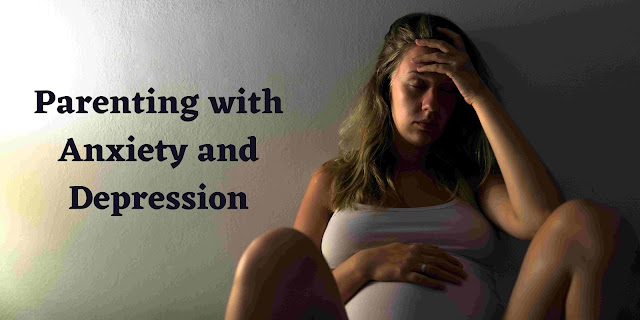Parenting is a demanding and rewarding journey, but it can be particularly challenging for individuals who face anxiety and depression. Coping with these mental health conditions while raising children requires special attention to self-care. In this article, we will explore the impact of anxiety and depression on parenting and provide practical strategies for practicing self-care, ensuring a healthy and positive parenting experience.
Understanding Anxiety and Depression
Anxiety and depression are common mental health disorders that affect millions of individuals worldwide. Anxiety is characterized by persistent feelings of fear, worry, and unease, while depression is characterized by persistent sadness, loss of interest, and a lack of energy. These conditions can significantly impact a person’s thoughts, emotions, and behaviors, making it challenging to fulfill daily responsibilities, including parenting.
Impact of Anxiety and Depression on Parenting
Parenting with anxiety and depression can present unique challenges. The symptoms associated with these conditions, such as excessive worry, irritability, and fatigue, can interfere with a parent’s ability to provide emotional support, engage in daily activities, and maintain a nurturing environment for their children. Additionally, the guilt and self-doubt that often accompany anxiety and depression can further exacerbate these challenges, leading to feelings of inadequacy and frustration.
Importance of Self-Care
Self-care is crucial for parents dealing with anxiety and depression. It involves intentionally taking care of one’s physical, emotional, and mental well-being to enhance overall resilience and coping abilities. By prioritizing self-care, parents can better manage their mental health and create a healthier environment for both themselves and their children.
Strategies for Self-Care
1. Prioritize Your Mental Health
Make mental health a top priority by incorporating self-care practices into your daily routine. This includes setting aside time for activities that bring you joy, relaxation, and peace of mind. Whether it’s reading a book, taking a walk in nature, or practicing a hobby, nurturing your mental well-being will positively impact your parenting.
2. Seek Support
Reach out to friends, family, or support groups who can provide a listening ear and understanding. Sharing your experiences with others who have similar struggles can alleviate feelings of isolation and offer valuable insights and encouragement. Remember, you don’t have to face parenting challenges alone.
3. Practice Mindfulness and Relaxation Techniques
Engage in mindfulness exercises and relaxation techniques to reduce anxiety and stress. Deep breathing, meditation, and yoga are effective practices that promote a sense of calmness and help restore emotional balance. Incorporating these techniques into your daily routine can contribute to better mental health and parenting.
4. Maintain a Healthy Lifestyle
Nurture your physical well-being by adopting a healthy lifestyle. Eat nutritious meals, prioritize regular exercise, and ensure you get enough sleep. A healthy body supports a healthy mind, enabling you to cope with parenting challenges more effectively.
5. Set Realistic Expectations
Avoid setting unrealistic expectations for yourself as a parent. Acknowledge that you may have limitations due to your anxiety and depression, and that it’s okay to ask for help. Embrace the idea that being a good parent does not mean being perfect, but rather being present, loving, and supportive.
6. Create a Supportive Environment
Establish a nurturing and supportive environment for yourself and your children. Surround yourself with positive influences, minimize exposure to triggers that exacerbate your anxiety and depression, and create a safe space where open communication is encouraged.
7. Seek Professional Help
If your anxiety and depression significantly impact your ability to parent and practice self-care, don’t hesitate to seek professional help. Therapists, counselors, and mental health professionals can provide guidance, support, and specialized treatments that cater to your individual needs.
Communicating with Your Children
Open and honest communication is vital when parenting with anxiety and depression. Explain your condition to your children in an age-appropriate manner, helping them understand that it is not their fault and that you are taking steps to manage it. Encourage them to express their feelings and concerns, and reassure them of your love and commitment.
Building a Support Network
Building a support network is essential for parents with anxiety and depression. Reach out to local parenting groups, mental health organizations, or online communities where you can connect with other individuals facing similar challenges. Sharing experiences, seeking advice, and receiving encouragement from others can be immensely helpful on your parenting journey.
Seeking Professional Help
If you find that your anxiety and depression continue to interfere significantly with your ability to parent and care for yourself, it may be necessary to seek professional help. A mental health professional can provide a comprehensive evaluation, diagnosis, and individualized treatment plan tailored to your specific needs.
Also Read: Parenting with Anxiety and Depression
Conclusion
Parenting with anxiety and depression can be challenging, but by prioritizing self-care, seeking support, and implementing coping strategies, it is possible to create a nurturing and positive environment for both yourself and your children. Remember, taking care of your mental health is not selfish but essential for effective parenting. By incorporating self-care practices into your routine, you can navigate the challenges of parenting while managing your anxiety and depression successfully.








